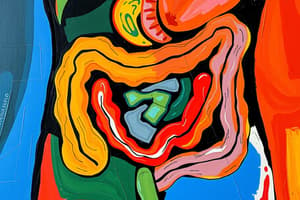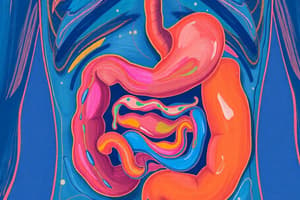Podcast
Questions and Answers
The alimentary canal starts at the mouth and ends at the rectum.
The alimentary canal starts at the mouth and ends at the rectum.
False (B)
In the oral cavity, we produce bile to aid in digestion.
In the oral cavity, we produce bile to aid in digestion.
False (B)
The pharynx is a muscular tube connecting the mouth with the esophagus.
The pharynx is a muscular tube connecting the mouth with the esophagus.
False (B)
Peristalsis is a wave-like movement that propels chyme through the digestive tract.
Peristalsis is a wave-like movement that propels chyme through the digestive tract.
Absorption of nutrients primarily occurs in the large intestine.
Absorption of nutrients primarily occurs in the large intestine.
The process of defecation involves the expulsion of solid waste from the body through the mouth.
The process of defecation involves the expulsion of solid waste from the body through the mouth.
Peristalsis only occurs in the stomach and large intestine.
Peristalsis only occurs in the stomach and large intestine.
Chyme is broken down into smaller components by acids, enzymes, and mechanical action in the small intestine.
Chyme is broken down into smaller components by acids, enzymes, and mechanical action in the small intestine.
Nutrients are absorbed into the bloodstream through the walls of the large intestine.
Nutrients are absorbed into the bloodstream through the walls of the large intestine.
Assimilation of nutrients allows cells to shrink and malfunction.
Assimilation of nutrients allows cells to shrink and malfunction.
The human body relies on the digestive system for growth, repair, and everyday functioning.
The human body relies on the digestive system for growth, repair, and everyday functioning.
Peristalsis is a process that involves the expansion of muscle fibers in the gastrointestinal tract.
Peristalsis is a process that involves the expansion of muscle fibers in the gastrointestinal tract.
Study Notes
The Digestive System
The digestive system is a complex network of organs responsible for breaking down food into nutrients that can be absorbed by the body. This process begins when you put food in your mouth and ends with the expulsion of waste from the body through defecation. Here's how it works:
The Alimentary Canal
The alimentary canal is essentially the digestive tract. It starts at the mouth, where you chew and swallow food, and ends at the anus, where waste products exit the body. Along the way, the food encounters various structures designed to break it down further.
The Buccal Cavity (Oral Cavity)
This is where the journey begins. In the oral cavity, we use our teeth to tear and mash up solid foods so they are easier for us to swallow. We also produce saliva, which contains enzymes that start breaking down carbohydrates.
The Pharynx
Food travels down the throat into the pharynx, a muscular tube connecting the nasal passage and larynx with the esophagus. At this point, the food is a liquidy mixture called chyme, which will pass through the rest of the digestive tract.
The Oesophagus
From the pharynx, the chyme moves into the oesophagus, which carries it to the stomach. Peristalsis, a wave-like movement of muscles, propels the chyme forward along the esophageal walls.
The Anus
On the other end of the digestive system is the anus, where feces (solid waste) leave the body via defecation.
Peristalsis
Peristalsis is the coordinated contraction of smooth muscle fibers located throughout the gastrointestinal tract, including the esophagus, stomach, small intestine, and large intestine. These contractions help move food through the digestive system, pushing it from one location to another until it reaches its final destination.
Absorption and Assimilation of Food
As the chyme moves through the digestive system, it is broken down into smaller components by acids, enzymes, and mechanical action. The resulting nutrients are then absorbed into the bloodstream through the walls of the small intestine. Finally, these nutrients are assimilated into cells, allowing them to grow and function properly.
In summary, the digestive system involves several interconnected processes working together to convert food into energy and building blocks needed for life. From the initial bite to the final excretion of wastes, the human body relies on this complex apparatus to support growth, repair, and everyday functioning.
Studying That Suits You
Use AI to generate personalized quizzes and flashcards to suit your learning preferences.
Description
Learn about the complex network of organs that make up the digestive system and how they work together to break down food, absorb nutrients, and eliminate waste. From the journey of food through the alimentary canal to the process of absorption and assimilation, explore the key components of this vital system.




